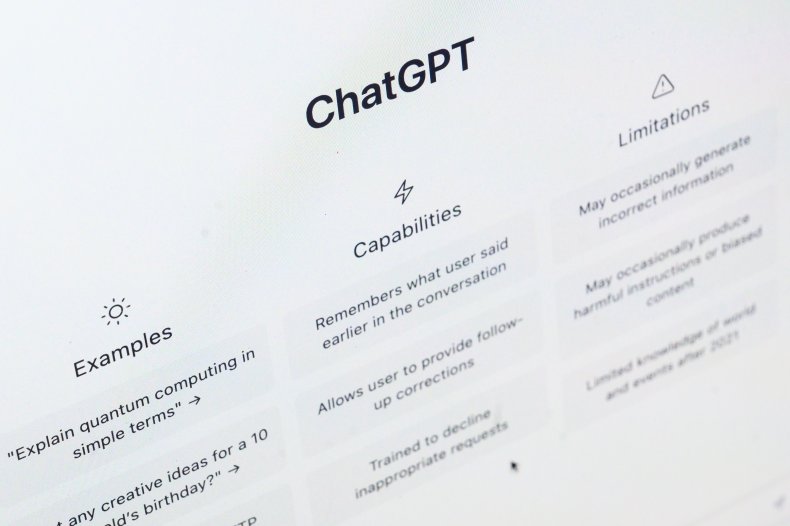OLIVIER GUITTA
An actual human being wrote this column, not one of the artificial intelligence-based bots like ChatGPT or Bard, which have recently dominated headlines and public consciousness. While these chat-based AIs have largely served so far as amusement, AI's role in everyday life is set to increase exponentially—and a global war over AI's national security applications is already underway.
China, in particular, has been swift to react to these American-developed tools' rapid deployment—San Francisco-developed ChatGPT, for example, became the fastest-growing consumer app in history, blazing past 100 million users two months after launching. Beijing rapidly clamped down on access to ChatGPT and used state media to release pointed videos about "how the US uses AI to spread disinformation."
In parallel, a whole host of Chinese companies have stepped up their own conversational AI tools. The "Chinese Google," Baidu, said it would unveil its Ernie Bot in March after completing internal testing. Alibaba, China's e-commerce leader, is also testing its own ChatGPT-style tool, while a plethora of smaller players are rushing to market their own solutions.
As this international AI competition heats up and positive applications for the technology abound, experts are also paying increasing attention to its potential nefarious uses. As the CEO of cyber defense company Check Point Software Gil Shwed underlined, generative AI makes writing malware very easy: "You can go to a tool like ChatGPT, ask it to develop a back-office application that collects information and then write a phishing email from that info that looks perfect. You can do all of that without knowing how to program or having the best English to write those emails." Within two months of its launch, ChatGPT has already been used in several cyberattacks.
While AI-assisted malware is certainly concerning, what remains the most alarming for the West is how artificial intelligence is changing the future of warfare—even faster than expected. The Chinese military has been investing heavily in intelligent warfare, making weapons systems and military operations more networked and autonomous. The People's Republic of China is already incorporating AI into its military strategy, including in autonomous vehicles, intelligence analysis, decision support, electronic warfare and cyber operations.
As the rift between Beijing and the West widens and tensions rise, it should seriously concern Western policymakers that China is among the leaders in AI research and development and uptake for military purposes, on top of its commanding lead in 37 out of 44 key technology fields, from defense to robotics and AI.
Under these circumstances, Brussels and Washington desperately need to step up their own investments into AI and similarly crucial technologies. AI investment alone, however, won't be enough to stay competitive in this pivotal area—they also need to build the cutting-edge digital infrastructure base upon which AI advances can strive and be effectively implemented.
In the European Union (EU), €1 billion is already earmarked for AI through EU programs like Horizon Europe and Digital Europe, but the investments needed to secure this essential digital infrastructure are likely in the tens of billions—sums that national governments are loath to spare under present economic conditions. The funds must be found somewhere, or the EU will fall dangerously behind in the digital sphere, imperiling its national security.
 The homepage for OpenAI's ChatGPT app is displayed.LEON NEAL/GETTY IMAGES
The homepage for OpenAI's ChatGPT app is displayed.LEON NEAL/GETTY IMAGESThe European Commission has proffered one suggestion, which could enable telecom operators to invest appropriately into improving the infrastructures they operate without tapping into tight national budgets. Since Big Tech firms such as Google, Meta, and Amazon are responsible for using 56 percent of total broadband, it seems appropriate for them to pay a "fair share" of network costs, thus providing the financing necessary for large-scale security upgrades. The idea of implementing such a system on a large scale in Europe—and perhaps the United States as well—has unsurprisingly received pushback from the tech giants, but has garnered widespread support elsewhere, including from countries like France, Italy, and Spain, as well as leaders at the U.S. Federal Communications Commission (FCC).
An agreement to get the tech giants to contribute their fair share of network costs could ultimately help the EU and the U.S. to create an effective, operating digital infrastructure serving as the foundation for technological advancement and knowledge—and perhaps most importantly, shore up their preparedness for the wave of digital attacks and AI-based national security risks that has already begun.
While security discourse in the West has been dominated over the past year by the more conventional warfare taking place in Ukraine, national security is far more than tanks and fighter jets. With AI becoming increasingly sophisticated and intertwined with our daily lives, the West needs to be prepared—technically and financially—to defend itself on that battlefield as well.
No comments:
Post a Comment